Ministry of Tribal Affairs
Year End Review- 2020 - Ministry of Tribal Affairs
M/O Tribal Affairs includes 23 additional MFP items in MSP list
M/O Tribal Affairs receives skoch gold award for its “Empowerment of tribals through it enabled scholarship schemes”
‘Goal’ programme launched for digital skilling of tribal youth across India in partnership with Facebook
Tribal Health & Nutrition Portal – ‘Swasthya’ launched; opens National overseas portal & tribal fellowship portal
MOTA & IIPA sign MoU for setting up National Institute of tribal research at IIPA Campus, New Delhi
In a new convergence based initiative, Van Dhan Kendras to be transformed into tribal enterprises mode under a cluster based model of development
Posted On:
02 JAN 2021 1:25PM by PIB Delhi
The Ministry of Tribal Affairs is the nodal Ministry for overall policy, planning and coordination of programmes for development of Scheduled Tribes (STs). To this end, Ministry of Tribal Affairs has undertaken activities that follow from the subjects allocated under the Government of India (Allocation of Business) Rules, 1961.There was considerable progress in digital mechanisms and online monitoring systems especially for scholarship schemes and expenditure of funds for tribal welfare. Tribal medicine emerged as another priority area along with tribal research. Expansion of Eklavya Model Residential Schools was stepped up this year while empowerment of tribals through schemes like Van DhanYojana and Aadi Mahotsavas also remained on the forefront. Affirmation of tribal rights and their role in forest development was another important highlight this year.
- Expansion of Scheme of Minimum Support Price(MSP) for Minor Forest Produce(MFP) and Upward Revision of MSP of Existing Items during 2020
During 2020, sweeping changes were made in the existing list of MFP covered under MSP as well as upward revision of MSP of 49 items of MFP in view of the exceptional and very difficult circumstances prevailing in the country on account of the COVID-19 Pandemic, and the potential of the Ministry of Tribal Affairs scheme to offer the much needed support to the tribal MFP gatherers.
The unprecedented circumstances caused by the ongoing COVID-19 pandemic threw up challenges and resulted in a severe crisis among the tribal population. Unemployment among youth, reverse migration of tribals threatened to throw the entire tribal economy off track. It is in such a scenario that the MSP for MFP has presented an opportunity to all the States.
In May this year, the Ministry of Tribal Affairs announced Inclusion of 23 additional Minor Forest Produce (MFP) items and stipulation of their Minimum Support Price (MSP) under the Centrally Sponsored Scheme titled "Mechanism for Marketing of Minor Forest Produce (MFP) through Minimum Support Price (MSP) and development of value chain of MFP". This decision enhancing the coverage from 50 to 73 items.
In another crucial announcement affecting the livelihoods of tribal gatherers, the Government also revised the Minimum Support Price (MSP) for Minor Forest Produce (MFP) of 49 items. The increase across various items of minor forest produce ranges from 16% to 66%.
The increase in MSP as well as expansion of List of covered items under MFP gave the much needed momentum to procurement of Minor Tribal Produce this year. MSP for MFP scheme is to address several issues of exploitation by local traders, ensuring fair returns on their produce. The Scheme provides a social safety net to these underprivileged forest dwellers, and to aid in their empowerment.
14 of the newly added items, otherwise agricultural produce, are not commercially grown in the North Eastern part of India but are found to grow in the wild in forests. Hence, the Ministry favourably considered to include these specific items as MFP items for the North-East.
Both the above initiatives gave a massive thrust to procurement of MFP by the central and state agencies as well as private traders. The procurement by Central agencies was an unprecedented amount of about Rs 150 crore accompanied by manifold higher procurement of MFP by state agencies as well as private traders.
2. Ministry of Tribal Affairs launches ‘Goal’ programme for Digital Skilling of Tribal Youth across India in partnership with Facebook (15th May, 2020)
Ministry Tribal Affairs launched the “GOAL (Going Online As Leaders)” programme. The GOAL programme is designed to provide mentorship to tribal youth through digital mode. The digitally enabled program envisages to act as a catalyst to explore hidden talents of the tribal youth, which will help in their personal development as well as contribute to all-round upliftment of their society.The link of the Webinar is as follows :
https://www.facebook.com/arjunmunda/videos/172233970820550/UzpfSTY1Nzg2NDIxNzU5NjMzNDoyODg4MDg1MTAxMjQwODkw/
The Digital literacy has gained importance in view of challenges posed by Covid pandemic. MoTA’s partnership with Facebook through GOAL programme has come at the right time to provide a platform to tribal youth and women to move ahead in life. The program intends to upskill and empower 5,000 tribal youths in the current phase to harness the full potential of digital platforms and tools to learn new ways of doing business, explore and connect with domestic and international markets. The digital skilling and technology will integrate them into the mainstream. The programme has been designed with a long term vision to develop the potential of tribal youth and women to help them acquire skills and knowledge through mentorship in various sectors including horticulture, food processing, bee keeping, tribal art and culture, medicinal herbs, entrepreneurship among others.Starting with 5000, the programme can be extended to cover any number of tribal persons who show keen interest in being mentored to achieve their goals.
The intent and content of GOAL program is unique and influential. This will go a long way in creating an environment for empowerment of tribal women by connecting them with digital world and use digital platforms to groom their talents. She hoped that the GOAL program will be successful in making fruitful impact towards enabling the ST youth to become financially independent. The GOAL programme demonstrates affirmative action which will go a long way to reduce the gap between tribal and non-tribal youth and will enlist participation of tribal youth in national building.
- Ministry of Tribal Affairs Launches Tribal Health & Nutrition Portal – ‘Swasthya’ (17th August, 2020)
Ministry of Tribal Affairs launched the Tribal Health and Nutrition Portal ‘Swasthya’ and opened National Overseas Portal and National Tribal Fellowship Portal. The e-portal on tribal health and nutrition named ‘Swasthya’, is a first of its kind e-portal, providing all health and nutrition related information of the tribal population of India in a single platform. Swasthya will also curate innovative practices, research briefs, case studies, and best practices collected from different parts of India to facilitate the exchange of evidence, expertise and experiences. The of Tribal Affairs has recognized Piramal Swasthya as the Centre of Excellence for Knowledge Management (CoE for KM) for Health and Nutrition. The CoE will constantly engage with the Ministry and provide inputs to drive evidence-based policy and decision-making pertaining to health and nutrition of the tribal population of India. The portal http://swasthya.tribal.gov.in is hosted on NIC cloud.
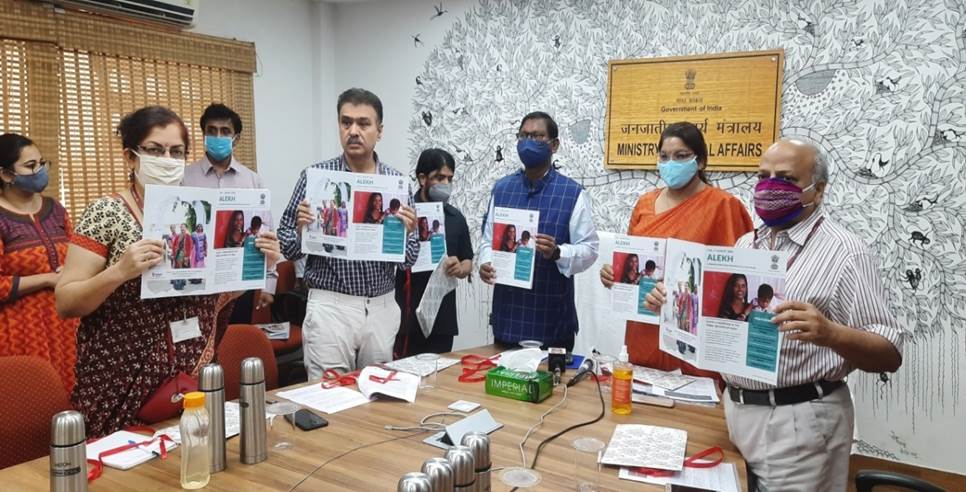
- Online Performance Dashboard named “Empowering Tribals, Transforming India” launched
As a part of unwavering commitment of Government of India to realize Digital India goals, MoTA is an early adopter amongst Social Ministries as it moved towards a data-driven Governance model to achieve digital inclusion, financial inclusion, productivity improvement and social impact. It is ensuring that administrative data forms the backbone of evidence-based decision making, outcome-oriented planning and service delivery to the beneficiaries. In this endeavor all schemes and initiatives of the Ministry of Tribal Affairs are digitalized through 20 scheme specific portals and applications which are integrated with the mother website of Ministry – www.tribal.nic.in, and with a comprehensive, interactive, dynamic Performance Dashboard https:// dashboard.tribal.gov.in.
Online Performance Dashboard named “Empowering Tribals, Transforming India” provides updated and real-time data and status of 15 schemes and initiatives of the Ministry meant for achieving the Sustainable Development Goals of the United Nations. This is perhaps the first such initiative of any social sector Ministry to put such a huge data in respect of all schemes and initiatives of the Ministry at one place.
Out of these, 5 are scholarship schemes of the Ministry where every year about 30 lakh underprivileged ST beneficiaries are given financial support of Rs 2500 cr for pursuing studies from 9th Class (Pre Matric) to doing Post Garduation courses PhD and Post Doctorate in India and Abroad. In respect of Centrally Sponsored Scheme like Post Matric and Pre Matric Scholarship, the data is shared by 31 States/UTs on DBT Portal before being displayed on dashboard.
The dashboard is part of Digital India Initiative to work towards empowering Scheduled Tribes and will bring efficiency and transparency in the system. The performance of Tribal Ministry and 37 other Ministries who are required to spend allocated amount of their budget for tribal welfare under STC Component as per mechanism framed by NITI Aayog can be seen on various parameters on dashboard. The dashboard will also be one-point link to all e-initiatives of the Ministry” The Dashboard has been developed by Centre of Excellence of Data Analytics (CEDA), organization under National Informatics Centre (NIC) with domain name (http://dashboard.tribal.gov.in).
5. Ministry of Tribal Affairs signs MoU with IIPA for Setting up National Institute of Tribal Research (NITR) at IIPA Campus, New Delhi (4th September, 2020)
Ministry of Tribal Affairs (MoTA) and Indian Institute of Public Administration (IIPA), New Delhi signed an MoU for setting up of National Institute of Tribal Research (NITR) at the IIPA campus, New Delhi. The proposed National Institute will be engaged in quality tribal research in collaboration with reputed government and non governments NGOs spread over the country. The agreement was signed by Shri Deepak Khandekar, Secretary Ministry of Tribal Affairs and Shri S.N. Tripathi, DG, IIPA at the valedictory session of “National Tribal Research Conclave” organized by Centre of Excellence (CoE) for Tribal Affairs, (M/o Tribal Affairs), Indian Institute of Public Administration (IIPA), New Delhi.
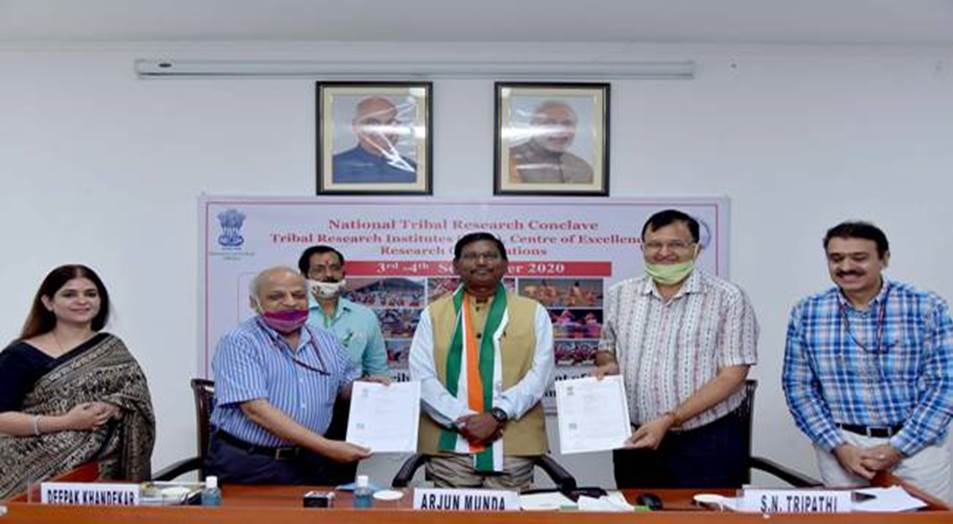
The Ministry of Tribal Affairs designed workable models which provide end to end solution as part of action research to be implemented by policy initiatives. The Tribal Research Institutes (TRIs) have a very important role to play and their research should focus on drawing road map for future development. The Ministry is funding Tribal Research Institutions for research on various aspects of tribal life and culture but now intervention of research with policy should be emphasized in their research.
6. Shri Arjun Munda Launches ‘Capacity Building Programme for Scheduled Tribes PRI Representatives’ and ‘1000 Springs Initiatives’ in Bhubaneswar (27th February, 2020)
Shri Arjun Munda, Union Minister for Tribal Affairs launched the “Programme for Capacity Building of Scheduled Tribe Representatives in Local Self Governments” at a programme in Bhubhaneswar (Odisha) . He also launched “1000 Spring Initiatives” and an online portal on GIS-based Spring Atlas with hydrological and chemical properties of the Springs on the occasion. The Chief Minister of Odisha Shri Navin Patnaik and Smt. Renuka Singh Saruta, Minister of State for Tribal Affairs also graced the occasion.A short documentary film on FRA in Odisha (Odisha’s Journey in FRA) and FRA Atlas of Odisha were also released.
The '1000 Springs Initiative’ is a unique project of Springs Rejuvenation which aims at improving access to safe and adequate water for the tribal communities living in difficult and inaccessible part of rural areas in the country. It is an integrated solution around natural springs. It includes provision of infrastructure for piped water supply for drinking; provision of water for irrigation; community-led total sanitation initiatives; and provision for water for backyard nutrition gardens, generating sustainable livelihood opportunities for the tribal people. He hoped that the learning and suggestions coming out of the consultation will be used for further expansion of the project.
The module for capacity building programme has been developed in conjunction with United Nations Development Programme for the purpose. This module will be translated to the local languages for imparting training. Facilitators from within the tribal communities will be involved in the Capacity Building process so that information sought to be conveyed can be better done in the local idiom. The methodology of capacity building will include audio-visual aids, role play and a workshop approach. The programme will commence with the Training of Master Trainers followed by training of facilitators. It will be implemented in a thematic manner by prioritizing themes for the capacity building of PRI Representatives, which are required for the community. The programme will be implemented by State governments through respective SIRD&PR and TRIs.
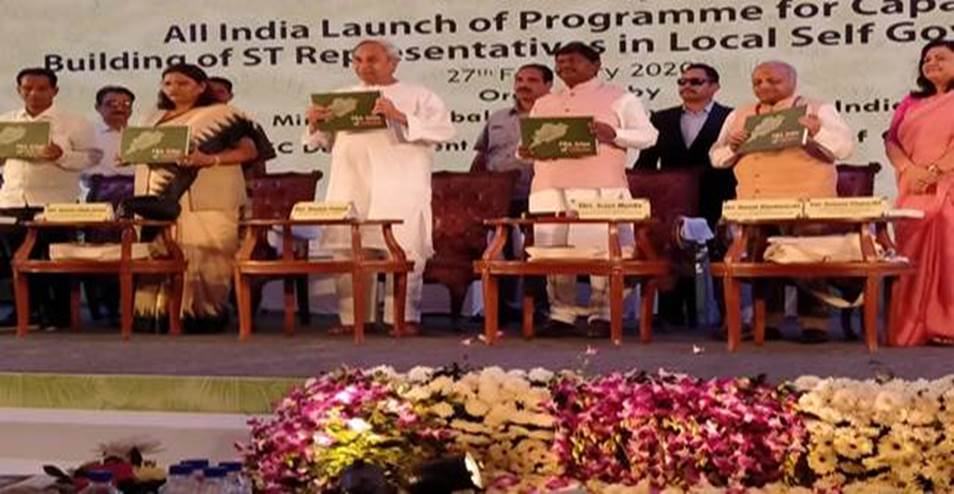
7. EMRS/EMDBS holidays re-scheduled in view of contingent health situation due to COVID-19 (26th March, 2020)
The Ministry of Tribal Affairs wrote to Tribal Development Departments of all States with Eklavya Model Residential Schools for rescheduling of Holidays in Eklavya Model Residential Schools (EMRS) and Eklavya Model Day Boarding Schools (EMDBS) funded by the Ministry of Tribal Affairs in view of the fact that at various places local administration have issued directions to take preventive measures including declaration of vacations to avoid spreading of infection due to Covid. In certain cases, the directions issued permits completion of the scheduled annual examinations.
-
- Shri Arjun Munda wrote to Chief Ministers to advise State Nodal Agencies for undertaking procurement of minor forest produce at MSP in right earnest (8th April, 2020)
The Union Minister for Tribal Affairs Shri Arjun Munda had written a letter to the Chief Ministers of 15 States to advise the State Nodal Agencies for undertaking procurement of Minor Forest Produce (MFP) at Minimum Support Price (MSP) in right earnest. These States include Uttar Pradesh; Gujarat; Madhya Pradesh; Karnataka; Maharashtra; Assam; Andhra Pradesh; Kerala; Manipur; Nagaland; West Bengal; Rajasthan; Odisha; Chhattisgarh; and Jharkhand.
In the letter, he said that the current situation brought about due to outbreak of Covid-19 has posed an unprecedented challenge across the country. Almost all the States and UTs in India are affected by it, to varying degrees. Poor and marginalized including the tribal communities are most vulnerable in this situation. This being the peak season for collection and harvest of Minor Forest Produce (MFP)/Non Timber Forest Produce (NTFP) in many regions makes it imperative to initiate certain proactive measures to ensure the wellbeing of the tribal communities and their economy based on MFP/NTFP by providing them safety and ensuring their livelihoods.
-
- Shri Arjun Munda launches ‘Goal’ programme of M/o Tribal Affairs for Digital Skilling of Tribal Youth across India in partnership with Facebook(15th May, 2020)
Union Minister for Tribal Affairs Shri Arjun Munda launched the “GOAL (Going Online As Leaders)” programme of the Ministry of Tribal Affairs (MoTA) in partnership with Facebook at a Webinar in New Delhi on 15th May, 2020. The GOAL programme is designed to provide mentorship to tribal youth through digital mode. The digitally enabled program envisages to act as a catalyst to explore hidden talents of the tribal youth, which will help in their personal development as well as contribute to all-round upliftment of their society.The link of the Webinar is as follows :
https://www.facebook.com/arjunmunda/videos/172233970820550/UzpfSTY1Nzg2NDIxNzU5NjMzNDoyODg4MDg1MTAxMjQwODkw/
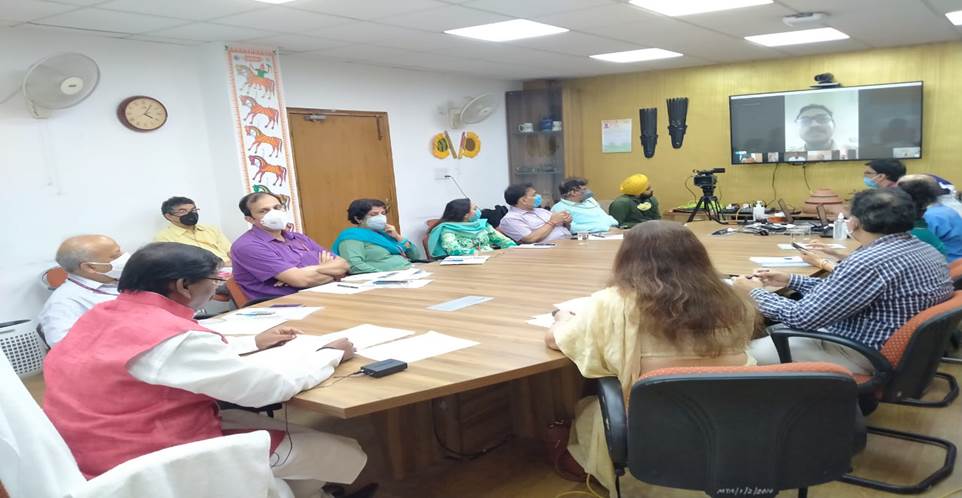
-
- M/o Tribal Affairs receives SKOCH Gold Award for its “Empowerment of Tribals through IT enabled Scholarship Schemes” (31st July, 2020)
Ministry of Tribal Affairs (MoTA) has received SKOCH Gold Award for its “Empowerment of Tribals through IT enabled Scholarship Schemes” project of Scholarship Division of the Ministry. The 66th SKOCH 2020 Competition was entitled “INDIA RESPONDS TO COVID THROUGH DIGITAL GOVERNANCE” and MoTA chose to participate in DIGITAL INDIA & E-GOVERNANCE - 2020 Competition and the awards were announced yesterday i.e. on 30th July, 2020. This project is a step towards achieving unwavering commitment of Government of India towards realizing the dreams of Digital India and bringing transparency as well as ease in the delivery of services. To assimilate with the larger vision of ‘Digital India’ and to realize the cherished goal of e-governance, MoTA has integrated all 5 Scholarship Schemes with DBT Portal under the guidance of DBT Mission. The initiative was rolled out on 12th June 2019 by the Union Minister for Tribal Affairs Shri Arjun Munda and MoS Ms Renuka Singh Saruta.
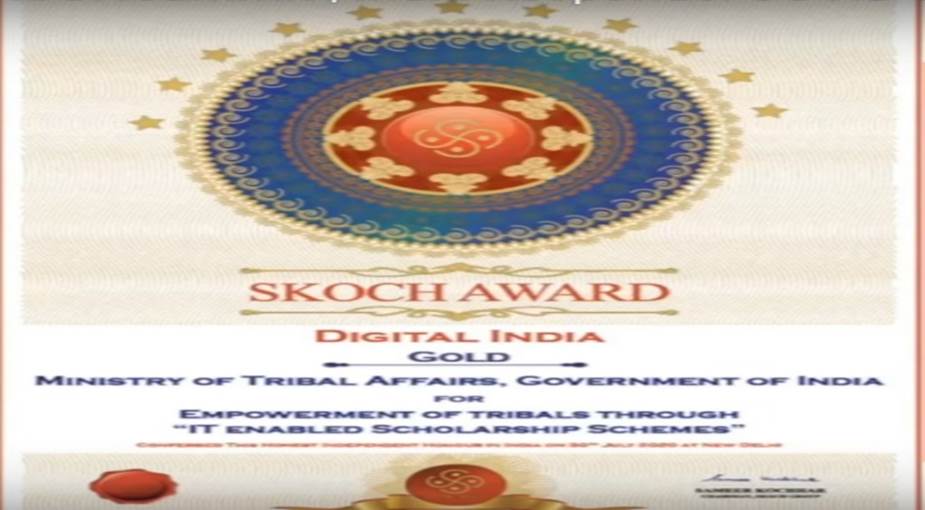
11. M/o Tribal Affairs Setting up Tribal Freedom Fighters’ Museums to give due Recognition to Sacrifices and Contribution to Country’s Freedom Struggle by Tribal People (11th August, 2020)
Ministry of Tribal Affairs is developing “Tribal Freedom Fighters’ Museums” dedicated to the contributions of the Tribal people in India to the freedom struggle pursuant to Prime Minister’s announcement in his Independence Day Speech on15thAugust 2016, regarding setting up of tribal freedom fighters’ museums. The Prime Minister in his address said, “The Government desires and is planning permanent museums in the States where Tribals lived, struggled against the British and refused to be bowed down. The Government will work to make such museums in different States so that the coming generations may know how our tribals were far ahead in making sacrifices”.
As per the directions of the Prime Minister, all the museums will have strong usage of technologies like Virtual Reality (VR), Augmented Reality (AR), 3D/7D holographic projections etc.
These museums will trace the history along the trails, along which the tribal people in hills and forests fought for their right to live and will, therefore, combine ex situ display with in situ conservation, regeneration initiatives. These will be museums, objects as well as ideas. These will demonstrate the way tribal struggles for protecting their custodial concerns for the biological and cultural diversity of the country, have helped in nation building.
12. Joint Communique Signed between M/O Tribal Affairs and M/O Food Processing Industries Defining Convergence Mechanism in Implementation of PMFME Scheme for Micro Food Processing Industries (18th December, 2020)
A “Joint Communique” was signed by Shri Deepak Khandekar, Secretary, Ministry of Tribal Affairs and Smt Pushpa Subrahmanyam, Secretary, Ministry of Minister for Food Processing Industries today in the presence of Shri Narendra Singh Tomar, Union Minister for Food Processing;Shri Arjun Munda, Minister of Tribal Affairs and Shri RameshwarTeli, Minister of State for Food Processing. The Joint communique addressed to States clearly defining Convergence mechanism in implementation of Pradhan Mantri Formalization of Micro Food Processing Enterprises (PMFME) Scheme of MoFPI and role of both Central Ministries and their respective departments at State level.

13. Success Story of Ice Stupa: Unique Initiative under Centre of Excellence Project
Resolving Water Problems in 26 villages through Ice Stupas in Ladakh in partnership with SECMOL
Ladakh is characterised by distinct geographical and climatic features. It is known as a cold desert. With reducing precipitation, increasing average temperatures, and reduced glaciers to water the villages , some Himalayan villages are now slowly turning into ghost towns with abandoned but habitable houses and wasted agricultural land. This gives rise to three major modern issues of Ladakh relating to water scarcity, low indoor temperatures in buildings, and a shift from the original agrarian-based economy resulting into youth migration.
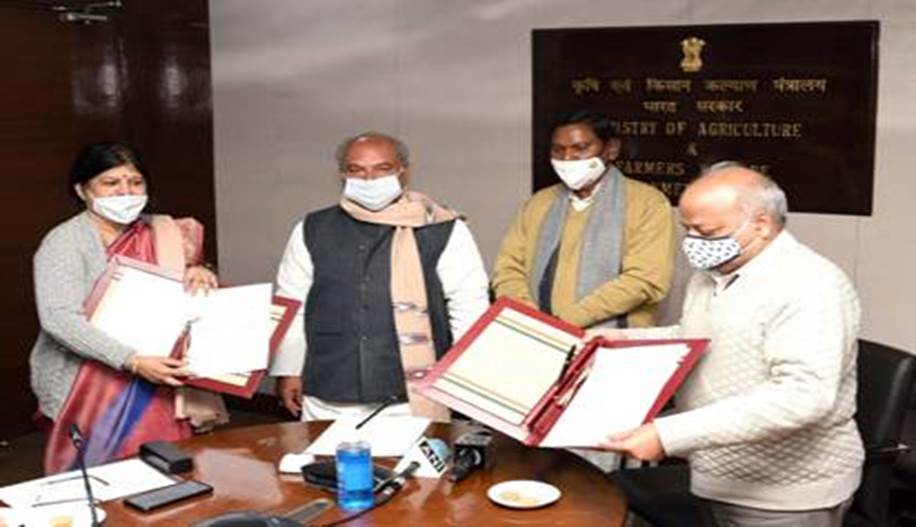
A unique way to solve water problems and livelihood problems through Action Research project in Ladakh has been initiated with SECMOL, Ladakh. 26 Ice stupas were built by Villagers and on an average 3 lakh liter water was stored in each such stupa for the winter season of 2019-20. Through this project, anticipating villagers were able to conserve about 75 lakh litres of water during winters and eco-tourism activities like “1st Ladakh Ice Climbing Festival” gave opportunity to the local youth to be indulged in eco-entrepreneurial ventures.
Ice Stupa Video Link: https://drive.google.com/file/d/1SS4tKjUisfQoPpfwk6DBMjF8rWinVxP-/view?usp=drivesdk





Image Clockwise the Ice Stupas of Ladakh in 2019-20 season. The 1st , 2nd and 3rd biggest Ice Stupas from the villages of Igoo, Tarchit and Phyang. The last image shows a stack of Ice Stupas built in Gangles valley during an Ice Valley prototype project to conserve and later supply water for downstream villages and ultimately Leh city.
It will help in rrehabilitation of abandoned villages and can change economy of the village by solving water problem, plantation of trees and irrigation. The stupas are source of tourist attraction and plantation of trees through community participation and engaging local in Home Stay project will help in their economic upliftment. In 2 years,Ice Stupas would be established in 50 villages for drinking water and water irrigation required for agriculture and would go a long way in changing economy of the area.
-
- TRIFED Launches transformational “Tech For Tribals” program in partnership with Institutes of National Importance (INIs) to develop Tribal entrepreneurship - (20 March, 2020)
A game changing and unique project aimed to transform Tribal Entrepreneurs under the name “Tech for Tribal” has been launched by Tribal Cooperative Marketing Development Federation of India (TRIFED). It was launched on19thMarch 2020 by TRIFED and IIT-Kanpur along with IIT-Roorkee, IIM Indore, Kalinga Institute of Social Science, Bhubaneshwar and SRIJAN, Jaipurin the first phase of organising tribal entrepreneurship and skill development program.
‘Tech for Tribals’, an initiative of TRIFED supported by Ministry of MSME, aims at capacity building and imparting entrepreneurship skills to tribal forest produce gatherers enrolled under the Pradhan Mantri Van Dhan Yojana(PMVDY). The trainees will undergo a 30 days program over six weeks comprising 120 sessions.
-
- TRIFED takes a giant leap towards digitisation of Tribal Commerce- (25 June, 2020)
TRIFED works for the promotion of tribal commerce in the best interests of almost 50 lakh forest dwelling tribal families aligning them to their skill sets, ensuring a fair deal to tribals in their trade of Minor Forest Produces, and Handlooms and Handicrafts. The value of this trade according to a NITI study is almost Rs 2 lakh crores per annum. To scale up the activities and create a level playing field, TRIFED has embarked on a digitisation drive to map and link its village based tribal producers to the national and international markets setting up state of art e- platforms benchmarked to international standards.
The digital transformation strategy includes a state of art website - (https://trifed.tribal.gov.in/); setting up of an e-Market Place for Tribal Artisans to trade and directly market their produces; digitisation of all information related to the forest dwellers engaged in its VanDhanYojana, village haats and warehouses to which they are linked. Keeping every aspect of tribal lives and commerce in mind, TRIFED has also embarked on the digitisation of the procurement of MFPs through government and private trade and the related payments to tribals.
E-Marketplace : Tribes India e-Marketplace, launched on Oct 2, 2020 is an ambitious initiative through which TRIFED of M/o Tribal affairs aims to onboard 5 lakh tribal producers for sourcing of various handicraft, handloom, natural food products across the country and brings to buyers the best of tribal produce. The suppliers comprise of individual tribal artisans, tribal SHGs, Organisations/ Agencies/ NGOs working with tribals.
-
- Trifed Launches its Own Virtual Office Network to Spearhead Tribal Socio-Economic Development on its 33rd Foundation day- (07 AUG 2020)
With Pandemic Covid-19 raging across the country, when every aspect of life has gone online, TRIFED has launched its own Virtual office on its Foundation Day, August 6, 2020. The TRIFED Virtual office network has 81 online workstations and 100 additional converging State and agency workstations that will help the team of TRIFED warriors work with their partners across the country – be they from the nodal agencies or implementation agencies –on Mission-mode towards bringing the tribal people closer to mainstream development.
-
- Team Trifed Wins Virtual Edition of National Awards for Excellence in PSU for Investment in Start-Ups – (14 OCT 2020)
The team of TRIFED Warriors has been working diligently towards the transformation of lives of the tribal population across the country. Their unstinted efforts and initiatives got worthy recognition at the Virtual Edition of National Awards for Excellence – PSU held on October 14, 2020.Combined, the team won three Awards: two individual awards for the exemplary and inspirational leadership of Shri Pravir Krishna(MD, TRIFED) in the CEO of the Year and Visionary Leadership Award categories and a collective award in the Investment in Start-Ups Category.
-
- Trifed, M/o Tribal Affairs to Expand Convergence Model in a big way to step up Tribal Incomes, Skills and Entrepreneurship..200 Projects to be taken up under Trifood/SFURTI Model-(26 November, 2020)
In a new convergence -based initiative, TRIFED of the M/o Tribal affairs has planned the transformation from the Van Dhan mode to the Tribal enterprise mode. One of the major actions being planned is the convergence of the Van DhanYojana with the MSP for MFP. A way of doing that will be through the convergence of the Van DhanYojana to the Enterprise Model: from processing to cluster development under SFURTI (Scheme of Fund for Regeneration of Traditional Industries) and TRIFOOD. In this cluster-based model of development, a typical SFURTI unit will include 10 Van Dhan Kendras (a cluster) and include 3000 households and encompass a tribal population of 15000 tribals. The TRIFOOD / SFURTI model converging both the MSP for MFP and the Van Dhan component, has already been launched in August in Raigad, Maharashtra and Jagdalpur, Chhattisgarh by the Tribal affairs Minister, Shri Arjun Munda. . It has been planned to take up 200 TRIFOOD projects across the country in the first phase in coming months with the plan to initiate 100 TRIFOOD projects immediately.
*****
NB/SK/jk/
(Release ID: 1685572)
Visitor Counter : 7688